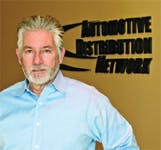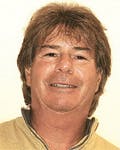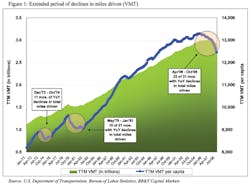From the Big Easy, the Network's Mike Lambert foresees a year that's anything but easy.
Perhaps no one knows about the ramifications of industry consolidation more than Mike Lambert, president of the Automotive Distribution Network. More than three years ago, Parts Plus merged with Independent Auto Parts of America (IAPA) to form what is now the Network. Additionally, Uni-Select, a Parts Plus member, has been voraciously purchasing chains and stores — and doesn't seem ready to slow down anytime soon.
Consolidation brings about challenges when merging cultures and attempting to attain economic synergies, says Lambert, who recently granted an exclusive interview to Aftermarket Business.He notes that a handful of manufacturers are responsible for more than 50 percent of the program group's volume, further illustrating the role consolidation plays in today's marketplace.
Lambert also emphasizes the importance of electronic technology in advancing our industry, whether it's through growing market share with data standards or making sure technicians keep up with vehicle technology.
In fact, technology has touched every aspect of how we do business, he says.
Parts proliferation, perception of the aftermarket and education are also vital issues to the industry, adds Lambert.Lambert was president of Parts Plus for nine years prior to the company's merger with IAPA. Upon graduation from the University of Southwestern Louisiana, he started his automotive career at NAPA as a field classification representative in New Orleans. He then became the purchasing manager for Borden-Aicklen, the first warehouse to join the newly founded CARQUEST program. He became sales manager after five years.
A.I. Automotive, a Kuwait firm, acquired Borden-Aicklen, and Lambert held several positions for them. He started A.I. Automotive's import division, Resource Automotive, was vice president of purchasing for their New York corporate office, and was general manager of the company's Chemical and Accessory Division.
In 1989, Lambert joined the Parts Plus Headquarters staff as vice president of Product and Marketing, and in 1995 was named president. He is a member of the Automotive Aftermarket Industry Association (AAIA) Show Committee and is on the Board of Directors for AAIA.
Now that it's been more than three years, has the Parts Plus IAPA merger fulfilled the expectations that were initially established? Why or why not? What have you learned that you wish you knew before the transaction took place?
The Network did fulfill our expectations of bringing these two diverse groups together by increasing our size and distribution footprint. Whenever two competitors merge, there is always a natural assumption that "we" are better, whichever side is the "we." IAPA has some really good companies, but more importantly, some really good individuals. Coming from the Parts Plus side, I did not know many of them, nor did the Parts Plus members. After three years together, you begin to understand that there really are not that many differences between the challenges we face each day in the marketplace. In the last few months, we have had several of their members adopt the Parts Plus brand. Those decisions were personally gratifying to me. In a merger, there is nothing that can take the place of time to develop a comfort level with your fellow members.
Distributor consolidation has been a big factor for the Network, as well as members such as Uni-Select. Do you foresee more consolidation in the aftermarket's future? How will continued consolidation affect the way traditional distributors and retailers operate (in pricing, inventory, customer service, etc.)? How about on the manufacturers' side—how is/will continued consolidation among manufacturers affect your group and members?
When I was younger, I did not realize one very basic concept in business: All owners eventually must seek an exit strategy to benefit from the asset that they have built over the years. This was brought home when the company I worked for in New Orleans sold to a large multinational firm. The owner only had two choices: to pass the business on to the next generation who was not interested or selling to a larger entity. He chose the latter and was able to benefit and cash in on the asset that he had built as a second-generation owner.
Will consolidation continue? Absolutely, it will. Uni-Select is one of the consolidators in our industry. They afford an option and an exit strategy for some business owners both within and outside of our group. Having said that, I take heart in the fact that some business owners are fortunate to have heirs who are willing — and more importantly, capable — of carrying on their family business. I see several second- and third-generation sons that have taken their businesses beyond what their fathers or grandfathers dreamed for the company.
Consolidation comes with its own set of challenges. First, you must mesh the cultures together, generally favoring the parent company while hopefully learning from the one that has been acquired. The economic synergies must be achieved, which, while not necessarily manifesting itself in price, hopefully will result in better profits, larger inventories and selected service offerings.
Manufacturers have been no strangers to consolidation, either. Five companies probably account for more than 50 percent of our and other groups' volume. It provides fewer choices for all of us. In many instances, we now have only two full-line product options from which to choose. I believe that this trend will also continue.
Not that we expect you to share any other merger plans with us, but could you please comment on if you think there will be more consolidation among program groups? Just what will the program group landscape look like five years from now?
I believe that more consolidation will take place. It has become the format for most businesses today both inside and outside our industry. What is often required is some dynamic event that spurs the various entities to action. Program groups are comprised of multiple warehouses and run by boards, as opposed to a company run by an individual. The decision process is much longer, and there are more people that need to gain acceptance to the concept. In our own merger, Uni-Select, Parts Plus' largest member, acquired MAWDI, IAPA's largest member. That was a dynamic event. That action allowed the natural effect of combining the two groups. As distributors consolidate, those changes will lead to other changes that will create dynamic events.
All aftermarket entities are struggling with price vs. added value. This situation is driven by the many and varied places where parts can be sourced. What is the Network's underlying philosophy on the issue as it relates to marketing, training and sales support — and is it a winning strategy as the industry becomes more competitive?
We certainly need the price to remain competitive with the retailers and other large single-owner companies. So you will not hear me say that price does not matter. All end users, however, buy based on a number of factors, including price, quality and service. And every consumer's perception of which of those factors is more important differs. We try to tailor the Network's marketing, training and sales support services to the person who is buying the product — whether that is a group of company stores, independent jobbers or service dealers. They decide what they want in added value. Our job is to have those services available if that particular group wants it, whether it's training, marketing support, sales support or just a sign. Many of our programs are menu-based with the exception of brand identity. If our customer decides the added-value services are beneficial to them, then he or she has the choice to make an investment in that service.
I do not believe price is everything, and we must have the value-added services available for our diverse customer base. It is our tools in the toolbox.
All signs point to gas prices not going down anytime soon. Is there anything specific that you can offer/are offering your members to meet this challenge? Moreover, how do you think the fuel price hike will affect the overall aftermarket? Is there a breaking point where driving habits will be severely curtailed? What is it, in your opinion?
I do not believe that anyone in our industry can do anything about the cost of petroleum in the world, which drives gasoline prices. The cost of petroleum has and will remain high in the future. We probably haven't seen the top yet.
That will have a general negative economic effect on all of us. Individuals will have less disposable income. It is ironic that while disposable income may lead some drivers to defer maintenance, the best action we can take to maximize fuel efficiency is to properly maintain our vehicles.
Our industry is fortunate that the American motoring public likes and needs their cars and the freedom that driving affords them. Public transportation still is not a viable answer for many of us. Certainly higher fuel prices will have an effect on miles driven, but we have not seen fuel prices reach a level at which we will stop driving. If there was a sudden and dramatic increase, perhaps $1 a gallon, that could alter driving habits.
We have experienced a slow upward creep in gasoline prices, which allows everyone time to adjust mentally and financially to the change. Consumers find other things to cut so they can maintain the freedom and necessity of their car. Consumers may defer car maintenance or not paint the house, but if the water pump goes out, it is getting replaced.
We must continue to work with our shops to ensure they have the ability to properly communicate needed services and their benefits to the consumers. And as everyone knows, consumers are looking for ways to reduce the effects of the high cost of fuel by purchasing hybrid and alternative fuel vehicles. We must ensure our shops have the training needed to maintain and service these vehicles.
Also, fuel in the U.S. is still a lot less expensive than Europe, but will probably continue to increase, and that difference will become smaller.
In our January State of the Industry report, most pricing had increased. How is that going to affect program groups trying to combat deferred maintenance?
I am not sure the two issues are directly related. We are in an industry where we have not seen prices rise substantially over the years. We can all cite examples of products that sell for less or the same as they did five or even 10 years ago, while our expenses have risen year after year. So price increases are not necessarily bad as long as everyone enjoys the increases at the same time. Deferred maintenance can be more closely associated with the overall economy and the general lack of available disposable income. Consumer awareness, or the lack of it, also affects consumers delaying maintenance that could eventually cost them more money. This is another case for "Be Car Care Aware." The better informed consumer will be less likely to defer needed repairs.
How has new electronic technology impacted the way the Network does business? Do you think the industry is headed toward collaboration on the use of/sharing of data, or is that a pipe dream?
Network members understand that electronic technology plays a critical role in maintaining and growing our market share. We were among the first program groups to embrace technology at a fundamental level. To give some specific examples, we developed our own central billing system for national accounts. We were early adopters of a proprietary Extranet. We stepped up to provide our affiliate jobbers with a branded distribution solution. More recently, we were among the first in promoting an e-commerce standard to our membership.
In spite of all our past successes in the technology arena, it shouldn't be a secret to anyone that the aftermarket is exploding with new technology opportunities and challenges. It's our job at the Network to ensure that our members and affiliates are exposed to those technologies. We accomplish that in many ways, some of which include: our bi-annual National Convention, our Network Magazine and our staff regularly meeting face-to-face with our affiliates.
It is safe to say that technology has touched almost every aspect of how we do business, from how we communicate with our affiliates, to how we deliver our programs. I am constantly challenging our staff to find technological solutions to everyday problems, and I see our members doing the same.
I feel that information sharing is going to be one of the most important things we do over the next decade. With the advent of market intelligence products coupled with industry standards and data warehouses, we have the opportunity to drive cost out of the supply chain and cooperate as an industry from top to bottom. One way we could assist the process might be to establish a standard for sales and inventory data in the same manner as ACES and PIES are transforming e-catalog and product information. This could allow competitive market intelligence products to play in the same sandbox. How about ISAS (Inventory and Sales Aftermarket Standard)? Perhaps it is a dream, but as we know, our enemy is not our fellow aftermarket companies. Not working together as an industry will be the nightmare.
And another technology question...but this time about new car technology. How much and how fast will new car technologies change the aftermarket from a distribution point-of-view, as well as a service point of view?
Technology in new cars takes many directions. One could look at hybrids, electric cars or hydrogen-propelled cars and ask who is going to work on them and where are the parts going to come from? Well, the answer better be us and the shops we service, or we will be relegated to the "ancient technology" vehicles. I am fully confident that the aftermarket is up to the challenge. Our current suppliers or new suppliers are making the new parts, and they will be available for the aftermarket when we need them.
Another aspect to new car technology could be On-Star® or the new Microsoft® vehicle products we have just read about. The aftermarket needs to tap into those communication features for the cars of today and tomorrow. That is a communication and convenience factor for the consumer that I do not want to give up to the car manufacturer. With the help of companies like Delphi, we will have to develop new alliances that will allow the aftermarket to compete in this arena.
How has Uni-Select's rapid growth affected the way ADN operates? Have you taken home any lessons from Uni-Select's situation? Has Uni-Select taken any lessons from the Network's playbook?
I have been associated with Uni-select since the early '90s, first when they were an international affiliate and now as a U.S. member. They have always been a good citizen of Parts Plus and now the Network. They are a large publicly traded (Canadian stock exchange) company that has more than tripled in size in that period. They have been as up-front and honest as they legally can, when a decision they make for their growth affects the rest of the membership. We still operate as a group, just as we always have. If Uni-Select knows that they could not support a particular decision because of their circumstances, we work together to develop a strategy that is good for all parties.
They have taught us how to approach some decisions in a different and perhaps bigger picture perspective. At the same time, I believe they have drawn on some of our marketing expertise and incorporated those ideas into their company.
I have always felt that even though Uni-Select is a very large entity, they gain some real market perspective from 40 fellow members. They gain market intelligence that they might not have gained on their own. While I am in no way privileged to their future plans, logic tells me that some of their future acquisitions could create dynamic events within other groups. As a consolidator, well, I would rather have them with me than against me.
What's the most important aspect of technician training for your group? And recruitment? On a wider scale, where do deficiencies exist in technician training and recruitment for the entire industry, and how do we correct them?
Our focus has been, and will continue to be, business training at the shop level. Many shops are struggling with the business aspect more than the technical aspect today. We see shops across the country with full bays, but not making a profit. Let's face it: shops today have more business/financial challenges than ever before. As we all know, the cost of operating a business including insurance, workman's comp, etc. continue to escalate at double digit percentages, yet profits are not increasing at a level to compensate. In addition to training on the financial aspect of operating a profitable shop, we also offer training to assist with team-building, marketing the business and complete business planning.
As for deficiencies, the biggest trouble is getting shops to look ahead, not looking at just today. Even if they are not facing some of these new technologies yet, they will be and they need to be proactive and ready for them tomorrow, next month, next year... they will see them. I would say the aftermarket as a whole struggles with getting shops to attend training, whether it is business or technical training. If there was ever a magic pill needed, it is to convince shops to attend training. If we look at other industries, many mandate yearly continuing education.
As I said earlier, recruitment of technicians is very difficult because of the perception the public has about the automotive business. Many parents direct their children anywhere other than the automotive business. We have cars being designed by people with PhDs, built by people with doctorates and worked on in some cases by people with GEDs! Through local and national efforts we must get our message to the high schools and vo-tech schools so young people can see the opportunity available in the aftermarket. Today's vehicles are not our father's vehicles. Just look under the hood, if you can! There are more computers/smart chips on vehicles today than ever imagined, controlling everything from air-fuel mixture, lighting, braking, ride control, comfort levels, emissions, where will it end? Today's technicians are truly computer diagnosticians.
Besides what we've already talked about, what other burning business issues do your members have to overcome?
This list could be quite long and it depends on who you ask. A short list that comes to mind however, is the ever popular parts proliferation. It is a fact and it is costly to have all the parts were they are needed and in 45 minutes or less. The increasing cost of fuel for delivery and the difficulty in passing along that cost. Hiring qualified counter people. I spoke about technicians earlier, but hiring good store personal is always a challenge. While these are some issues that affect our members, the problems that face independent jobbing stores and our service dealers quite often become our issues as well. We often seek solutions to their problems in our effort to be good business partners.
In your opinion, what are the three top burning issues/threats that the industry has to overcome? And how do you think those challenges can be met?
All three answers might revolve around the word perception.
We have a shortage of technicians. For too many parents and young people, there is still a perception of the "dirty mechanic" view of our industry. Good technicians can earn a comfortable living, work with computers every day and can always find a job. A good tech should never find themselves unemployed for more than five days. Now what other profession can say that?
The perception of aftermarket service — we still get painted with a broad brush of reliability and service. Now perception is reality here if the shop projects a bad public image, even if their work is excellent. More of the "Be Car Care Aware" on a local level needs to be done. But shops need to look to all retail establishments as their model. This is a message that all program groups have in common, and we all have tools and programs that can raise this perception level.
Last, the perception of the aftermarket as an afterthought. As an industry, we perpetuate this myth. We tell the public that our parts, our service and our training are "just as good" as the original manufacturer, when in many cases, it is better. In parts manufacturing, we have the luxury of hindsight. We know what is going to fail and why. Our suppliers can build a "better mouse trap" that is better than OE.
Education and communication are the solution to many of these issues. Support of our industry association AAIA (Automotive Aftermarket Industry Association) is the best method to get the collective word out to the kids, parents or consumers about our industry, the work we do and the products and services we offer.
What is the Network's stance on the Right to Repair?
The Network is a member of AAIA and supports their position. Ideally, we would like to work out non-legislative agreements with the car companies to provide access for the various systems to the independent technician. Of course this agreement would have to have enough teeth so that this information is forthcoming in an easily accessible, timely and affordable manner. Now barring that logical approach, we would recommend seeking legislative action on a national level that provides this information and ultimately gives more repair options to the consumer. AAIA will pursue this objective on a local level, as well, by trying to gain approval of similar legislation on a state-by-state basis. We are confident that AAIA will be successful. It is imperative that we succeed for the aftermarket's long-term viability.
Look into your crystal ball and tell us what you see in store for the automotive aftermarket for the remainder of the year. And, if you would, please take a longer view — what are the major changes we'll see in the aftermarket in the next five years?
All the indicators say that this is going to be a challenging year. Vehicles will be repaired but consumer confidence is always a factor in business. Not all of our revenue comes from individuals. Businesses are affected by the economy, so commercial accounts can have slowdowns that affect both our shops and our store sales.
One question you did not ask me was about China, big today, bigger tomorrow. Of course in five years we might begin to see the emergence of the "next China," whoever that might be. Earlier I commented that consolidation among the manufacturers has in many cases reduced our options. Well that is true in the domestic arena, but as the foreign manufacturers gain recognition, there will be manufacturing options that did not exist in the mainstream five years ago. Those companies have learned quality from our demands on them, and their coverage sometimes exceeds what is available from domestic brands. Where we source our parts and who we source them from in five years will change.
Telematics will have an even greater effect on the vehicle of tomorrow. The computer is king, and I cannot imagine what is in store for our shops and stores in five years. We must ensure our independent shops are profitable enough to be able to afford the training, tools and equipment to participate in this arena. This is why the Right to Repair is so important to the aftermarket.
About the Author



